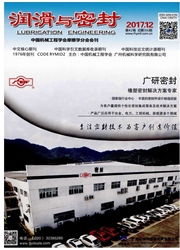

 中文摘要:
中文摘要:
合成了生物活性玻璃粉末,采用无压烧结工艺制备了Y—PSZ/BGC复合陶瓷材料。利用纳米硬度分析测试系统(Triboindenter)测定了复合陶瓷的纳米力学性能,用销盘式摩擦磨损试验机考察了血浆润滑条件下复合陶瓷的生物摩擦学性能。结果表明:BGC的加入量在10%~15%(质量分数)范围内,复合陶瓷的纳米力学性能最佳,同超高分子量聚乙烯配副时的摩擦因数和磨损率也最小。磨损表面的N元素波谱分析结果表明,摩擦副表面存在血浆蛋白质的沉积。
 英文摘要:
英文摘要:
Bioactive Glass Ceramic (BGC) particles were synthesized. Pressureless sintering (PS) was used to prepare yttria-partially-stabilized zirconia/BGC composites. The nanohardness and elastic modulus evaluations of all of BGC/partially stabilized zirconia (PSZ) ceramics were obtained by nanoindentation tests. It is found that 10% - 15% BGC (weight) composites show the highest hardness values. A pin-slid-on-disc tribometer was run to observe the tribological behaviors of these bioceramics against ultrahigh molecular weight polyethylene (UHMWPE) under human plasma lubrication. The experimental results demonstrate the lowest friction coefficient and wear rate are obtained for composite containing 10% weight for BGC. The analysis of nitrogen element indicates that the serous protein deposits on the friction and wear surfaces.
 同期刊论文项目
同期刊论文项目
 同项目期刊论文
同项目期刊论文
 Comparison of tribological behavior of nylon composites filled with zinc oxide particles and whisker
Comparison of tribological behavior of nylon composites filled with zinc oxide particles and whisker Biotribological behavior of ultra high molecular weight polyethylene composites containing bovine bo
Biotribological behavior of ultra high molecular weight polyethylene composites containing bovine bo Research on the structure characterization and the biotribological behaviors of PVA/HA composite hyd
Research on the structure characterization and the biotribological behaviors of PVA/HA composite hyd Research on the Long Time Swelling Properties of Poly (vinyl alcohol)/Hydroxylapatite Composite Hydr
Research on the Long Time Swelling Properties of Poly (vinyl alcohol)/Hydroxylapatite Composite Hydr Research on the friction and wear mechanism of poly(vinyl alcohol)/hydroxylapatite composite hydroge
Research on the friction and wear mechanism of poly(vinyl alcohol)/hydroxylapatite composite hydroge Biotribological behavior of ultra high molecular weight polyethylene composites filled with nano-ZrO
Biotribological behavior of ultra high molecular weight polyethylene composites filled with nano-ZrO Load Dependence of Nanohardness in Nitrogen Ion Implanted Ti6Al4V Alloy and Fractal Characterization
Load Dependence of Nanohardness in Nitrogen Ion Implanted Ti6Al4V Alloy and Fractal Characterization 期刊信息
期刊信息
